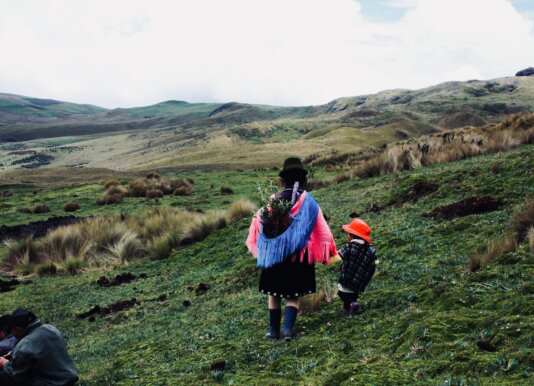- About
- Topics
- Story
- In-Depth
- Picks
- Opinion
- News
- Donate
- Signup for our newsletterOur Editors' Best Picks.Send
Read, Debate: Engage.
We might not see it in our everyday lives, but indigenous people all over the world are protecting their territories, the nature that surrounds them, and the biomes they live in. They do it as an intrinsic part of their existence.
I invite you to take a moment of reflection: what would the world be like without indigenous peoples? The answer is simple. It would not be - the world as we know it would no longer exist. And here is why.
Indigenous lands are shields against environmental destruction. Many of the most biodiverse forests in the Amazon basin are found in indigenous territories. If you look at a Google Earth map of the Amazon, you can see the islands of green formed by these territories while the surroundings are marked by increasing destruction.
This is particularly startling when it comes to the forests of uncontacted tribes - the most vulnerable peoples on the planet who can be wiped out if their territories are invaded, but who thrive when outsiders are kept out.
Indigenous peoples have a very different relationship with the land compared to non-indigenous peoples. For them, land is a fundamental part of everyday life. It is not an exaggeration to say that it is like a part of their body. Destroying it, therefore, is like violating their own self, causing deep pain and despair or even death.
It is difficult for us Westerners to truly comprehend this. Many in our society tend to see the natural world as a resource open to exploit, either for pleasure or for profit, and often like to think that humans are somehow separate from or even "above" nature.
This mindset has given rise to the colonial model of environmental conservation, which evicts indigenous peoples from their lands and leads to the torture and killing of indigenous people who do not comply.
Many Westerners are happy to destroy indigenous lands, full of the biodiversity that sustains our existence, in return for an abundance of fleeting, materialistic pleasures. Lives are destroyed for it.
In his book The Falling Sky, Yanomami shaman Davi Kopenawa paints a clear picture of this: "The white people already have more than enough metal to make their merchandise and their machines; land to plant their food; cloth to cover themselves; cars and airplanes to move in. Yet they covet the metal of our forest to make even more of these things though their factories’ foul breath is already spreading everywhere… its darkness may descend to our houses so that the children of our children will stop seeing the sun."
Meanwhile, in stark antithesis, most indigenous worldviews understand human beings and the environment they inhabit as inseparable and mutually interdependent. Their beliefs, moulded over generations of lived experience, lead them to protect nature and protect their people.
"We need to return to our land - because we are the land itself," said Merong, an indigenous man from the Kamakã Mongoió people from Brazil, explaining why they are fighting to reclaim their ancestral land which has been stolen from them for mining.
The same philosophy resonates among other peoples around the world. In India, JK Thimma, a Jenu Kuruba leader whose people have been forcefully evicted from their lands in the name of tiger conservation, asked: "How can the forest be protected if we don't do our rituals? [Outsiders] don’t have any understanding about how to protect it."
It would be idealistic to say that indigenous knowledge alone will save us from the climate crisis, but it is undeniable that the most intimate understanding humanity has of Earth’s diverse ecosystems lies with indigenous peoples’ lives and lands. It’s one of the most potent weapons we have in the fight to save our planet.
In contrast, our Achilles heel is the imperialist assumption that those "other" societies, who live off their land and have little to do with the globalised market economy, have a less sophisticated understanding of things than we do. Many are too quick to dismiss their knowledge and worldviews as myths and superstition, when in fact our own science is proving us wrong on this, in myriad examples worldwide.
The Alawa people of Australia’s Northern Territory use the word "Jarulan" to describe a unique type of wildfire; one that has been intentionally started by a bird. Jarulan is not a myth, it is not figurative and nor is the bird some kind of metaphor: this is literally true.
In a 2017 research paper, scientists stated what indigenous people had long known: that there are not one but three species of birds that spread fires deliberately to flush their prey out into the open.
While most scientific studies collect their data over months or years, indigenous expertise has had a head start of millennia and this is a perspective we cannot afford to ignore. Over 230,000 people died in the 2004 Asian tsunami, which seemed to come without warning. However, the indigenous peoples of the Andaman Islands did recognise the signs and took actions which kept them safe; these communities were largely unaffected by the disaster.
The knowledge that indigenous peoples hold is not only irreplaceable, it is vital; and if it is destroyed, we won’t be able to build it back.
For too long we have silenced the voices of those who see the world differently to us, and we’re all suffering for it. Instead, let's stand with indigenous peoples, let’s campaign for their land rights all over the world and let’s bring about a brighter future.
It is not just the Kamakã, the Jenu Kuruba or the Alawa who need that land - the very fate of life on Earth depends on it.
Survival International is a global movement for tribal peoples.
Image by Azzedine Rouichi.
